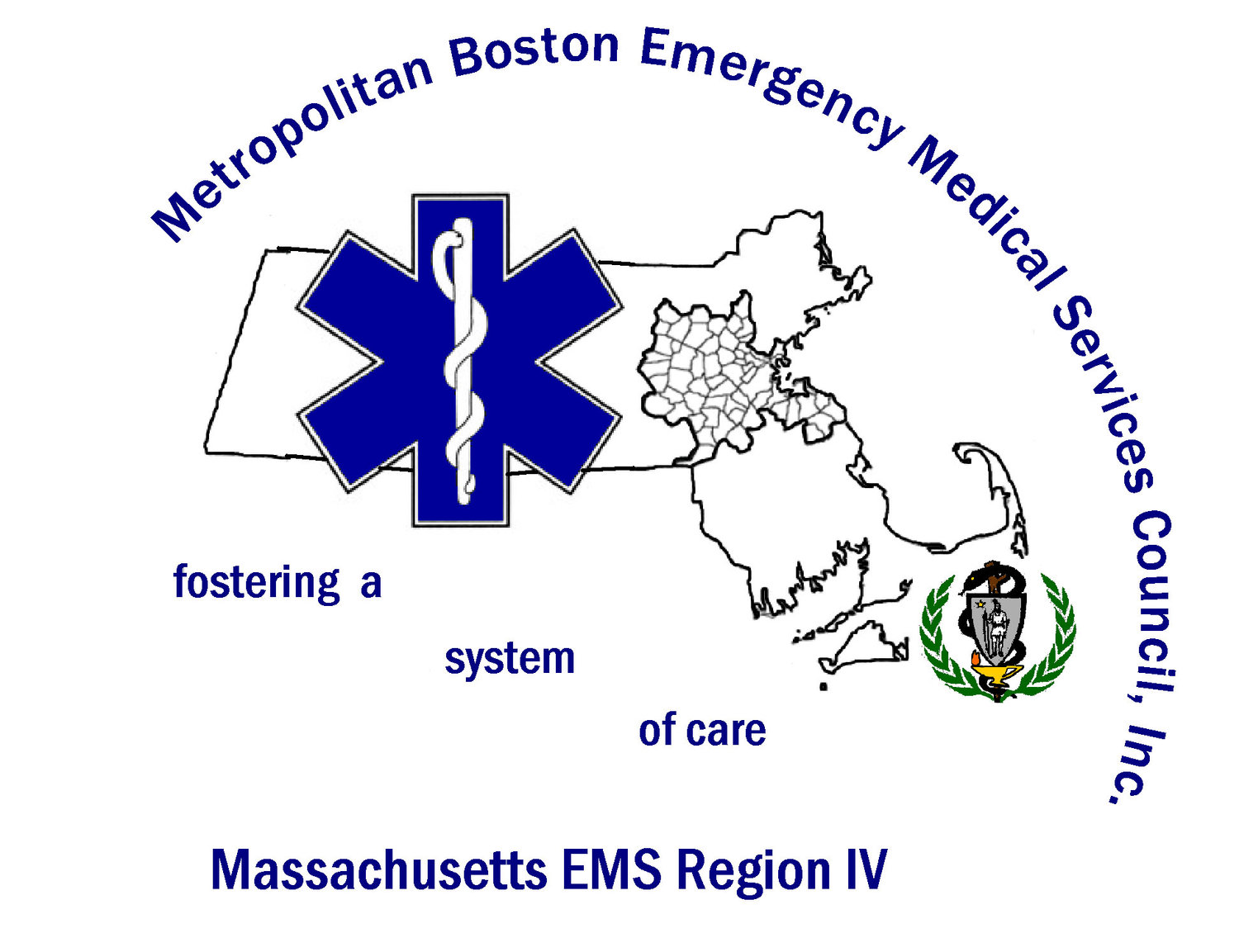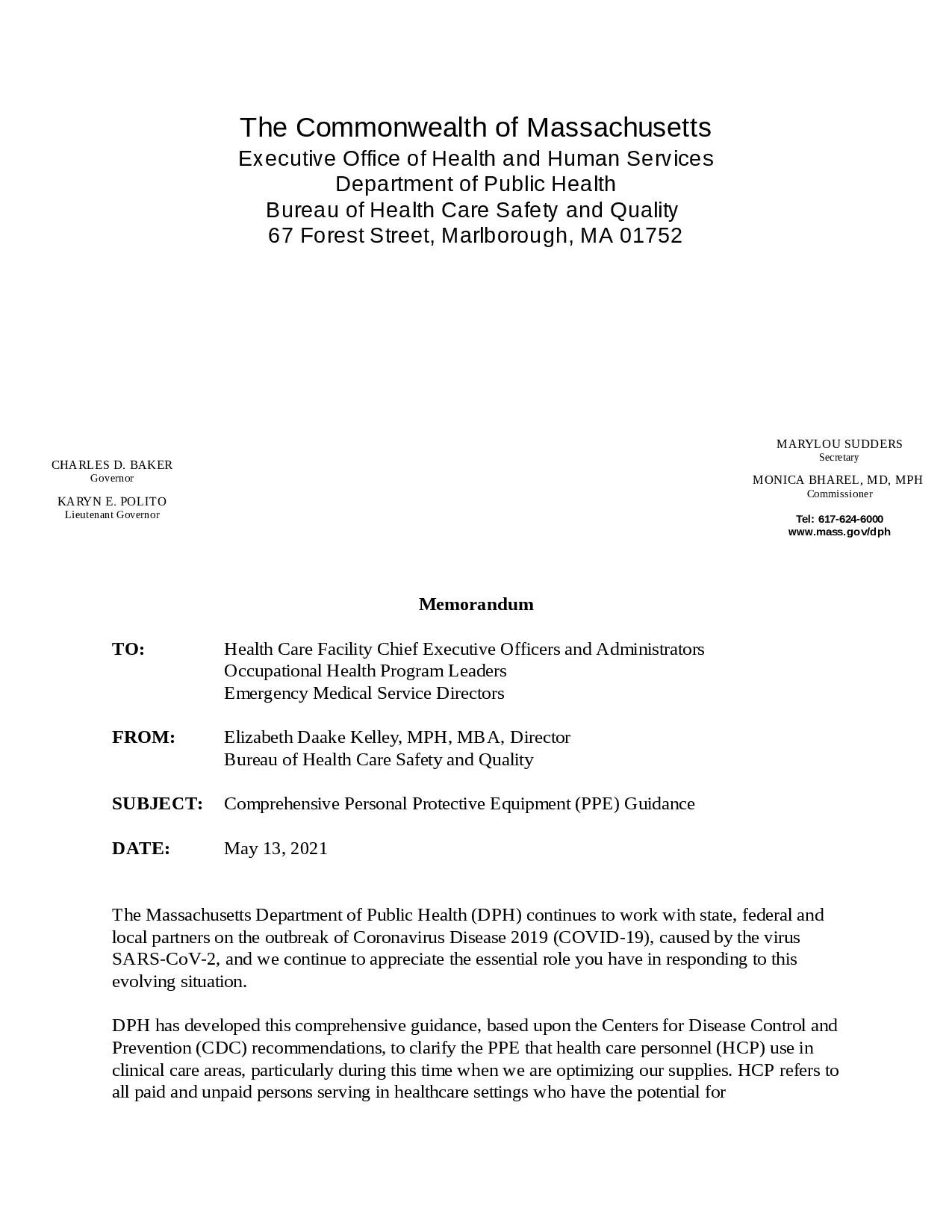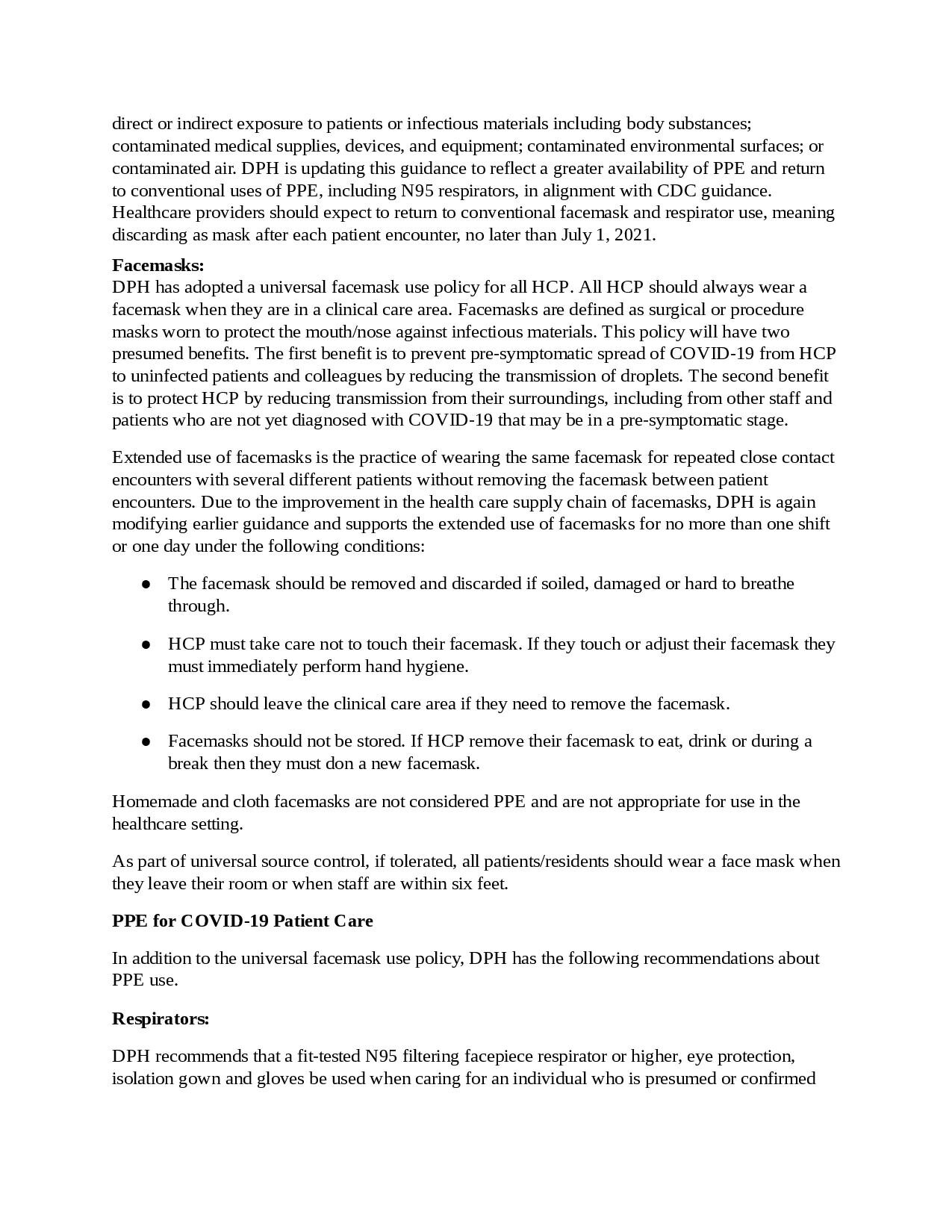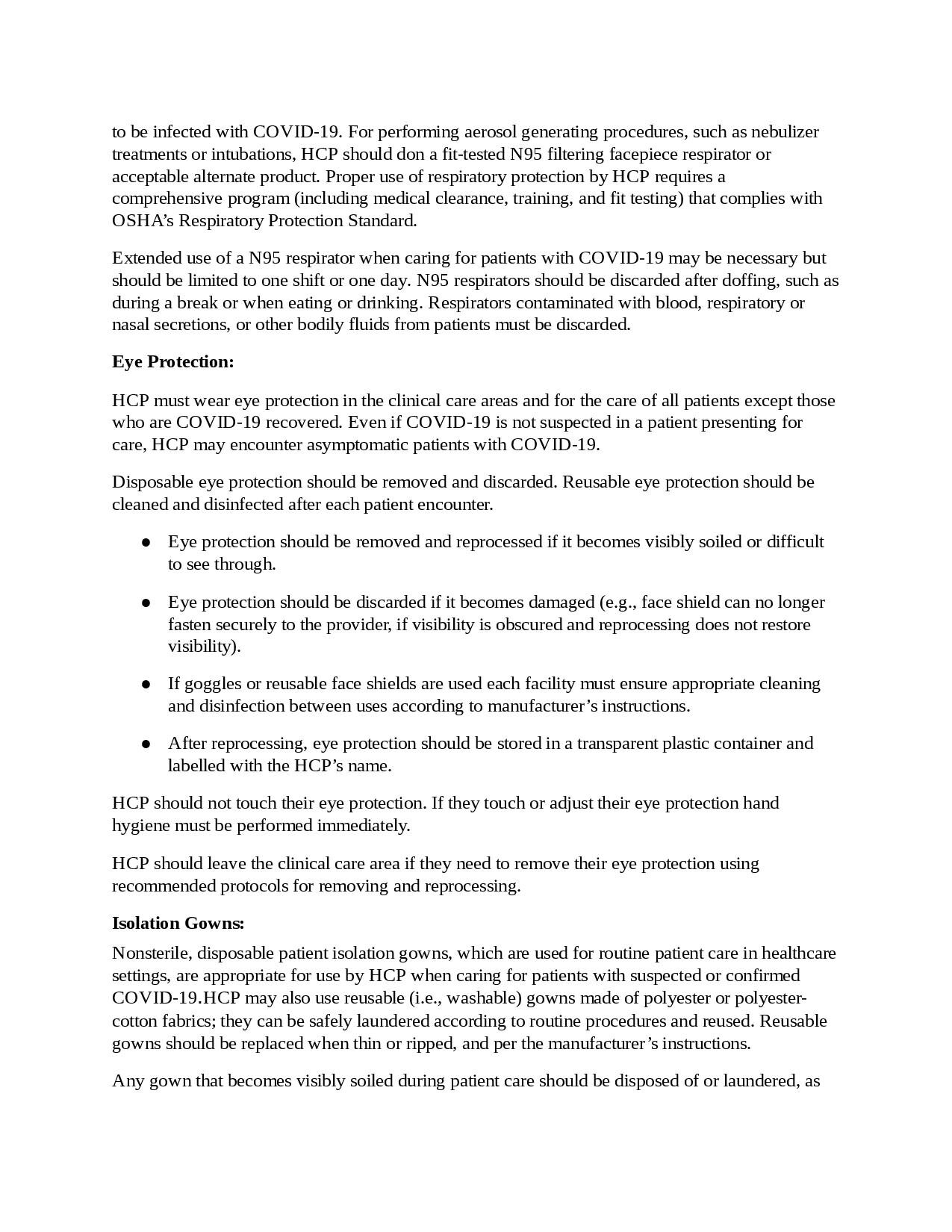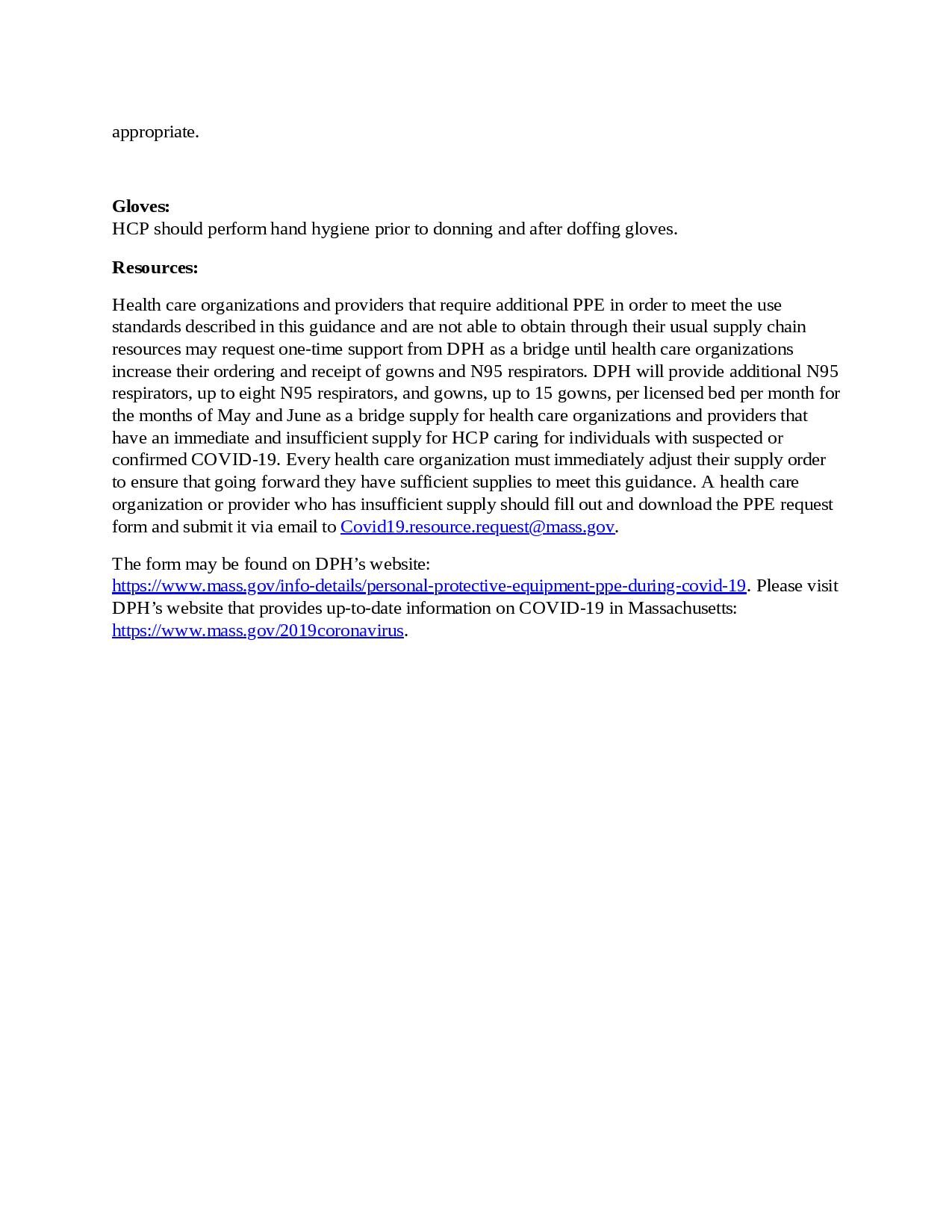
MA DPH Updated Comprehensive PPE Guidance
The Massachusetts Department of Public Health is releasing updated Comprehensive Personal Protective Equipment (PPE) Guidance. This guidance further updates the PPE standards for health care personnel. As part of this updated guidance, healthcare providers may implement policies to require HCP to use employer-issued PPE, and to preclude staff from using their own PPE absent appropriate safety and quality controls which may include but are not limited to fit-testing.
Memorandum
TO: Health Care Facility Chief Executive Officers and Administrators
Occupational Health Program Leaders
Emergency Medical Service Directors
FROM: Elizabeth Daake Kelley, MPH, MBA, Director
Bureau of Health Care Safety and Quality
SUBJECT: Comprehensive Personal Protective Equipment (PPE) Guidance
DATE: January 21, 2022
The Massachusetts Department of Public Health (DPH) continues to work with state, federal and local partners on the outbreak of Coronavirus Disease 2019 (COVID-19), caused by the virus SARS-CoV-2, and we continue to appreciate the essential role you have in responding to this evolving situation.
DPH has developed this comprehensive guidance, based upon the Centers for Disease Control and Prevention (CDC) recommendations, to clarify the PPE that health care personnel (HCP) use in clinical care areas and in other non-clinical areas in health care facilities. HCP refers to all paid and unpaid persons serving in healthcare settings and emergency medical services (EMS) who have the potential for direct or indirect exposure to patients or infectious materials including body substances; contaminated medical supplies, devices, and equipment; contaminated environmental surfaces; or contaminated air.[1] Healthcare settings are not limited to health care facilities but may include community settings where home health workers or EMS personnel are providing care to patients. This guidance further updates the PPE standards that HCP must follow. Healthcare providers may implement policies to require HCP to use employer-issued PPE, and to preclude staff from using their own PPE absent appropriate safety and quality controls which may include but are not limited to fit-testing.
These changes may be implemented immediately.
Universal Use of Facemasks
DPH has adopted a universal facemask use policy for all HCP. All HCP should don a facemask upon entry to the healthcare facility premises or care area (which includes ambulances); HCP working in community settings should don a facemask upon entry to the home or immediate area where they will be providing assessment and care. Facemasks are defined as surgical or procedure masks worn to protect the mouth/nose against infectious materials and have been shown to be highly effective at preventing transmission of COVID-19 when both individuals are masked. This policy will have two presumed benefits. The first benefit is to prevent pre-symptomatic spread of COVID-19 from HCP to patients, visitors and colleagues by reducing the transmission of droplets. The second benefit is to protect HCP by reducing transmission from their surroundings, including from other staff, visitors and patients who may be in a pre-symptomatic stage.
Extended use of facemasks is the practice of wearing the same facemask for repeated encounters with several different patients without removing the facemask between patient encounters. Due to improvement in the health care supply chain of facemasks, DPH is modifying earlier guidance and supports face mask use as follows:
As PPE to protect their nose and mouth from exposure to splashes, sprays, splatter, and respiratory secretions (e.g., for patients on Droplet Precautions). When used for this purpose, facemasks should be removed and discarded after each patient encounter.
As source control to cover one’s mouth and nose to prevent spread of respiratory secretions when they are talking, sneezing, or coughing. When used for this purpose, facemasks may be used for multiple patient encounters under the following conditions:
· The facemask should be removed and discarded if soiled, damaged, or hard to breathe through.
· HCP must take care not to touch their facemask. If they touch or adjust their facemask they must immediately perform hand hygiene.
· HCP should leave the clinical care area if they need to remove the facemask. (i.e., outside of the patient room)
· Facemasks should not be stored or put down on a surface; when removed, facemasks should be discarded and HCP should don a new facemask.
· If HCP remove their facemask to eat, drink or during a break they should perform hand hygiene with soap and water or an alcohol-based hand rub before and after touching their mask.
Homemade and cloth facemasks are not considered PPE and are not appropriate for use in the healthcare setting or by HCP.
As part of universal source control, if tolerated, patients/residents should wear a facemask issued by their provider when they leave their room or when staff are providing care to them.
PPE for patients with suspected or confirmed COVID-19, or confirmed exposures to COVID-19
DPH recommends that a fit-tested N95 filtering facepiece respirator or alternative, eye protection, isolation gown and gloves be used when caring for patients with suspected or confirmed COVID-19 or confirmed exposure to COVID-19.
Respirators:
Proper use of respiratory protection by HCP requires a comprehensive program (including medical clearance, training, and fit testing) that complies with OSHA’s Respiratory Protection Standard.
Facilities should eliminate the practice of reuse of N95 respirators with the exception of conditions outlined in Other Considerations. N95 respirators should always be discarded after doffing, such as when leaving a patient room, during a break or when eating or drinking. Respirators contaminated with blood, respiratory or nasal secretions, or other bodily fluids must be discarded immediately.
If reusable N95 respirator alternatives such as elastomeric respirators are used each facility must ensure appropriate cleaning and disinfection between uses and filter exchange according to manufacturer’s instructions. When used as source control, reusable N95 respirator alternatives may be worn between patients seen sequentially without cleaning and disinfection. If worn when seeing patients on transmission-based precautions, extended use may be performed if not contaminated.
Eye Protection:
At this time, when the risk of community transmission of COVID-19 in Massachusetts continues to be increased, HCP should wear eye protection for all patient encounters.
Disposable eye protection should be removed and discarded when it is removed for any reason; it should not be reused. Reusable eye protection should be cleaned and disinfected when visibly soiled and after removal/doffing of eye protection. Eye protection may be used for multiple patient encounters under the following conditions:
Eye protection should be removed and reprocessed if it becomes visibly soiled or difficult to see through.
Eye protection should be discarded if it becomes damaged (e.g., face shield can no longer fasten securely to the provider, if visibility is obscured and reprocessing does not restore visibility).
If reusable goggles or face shields are used each facility must ensure appropriate cleaning and disinfection between uses according to manufacturer’s instructions.
After cleaning and disinfection, reusable eye protection should be stored in a designated location.
HCP should not touch their eye protection while being worn. If they touch or adjust their eye protection hand hygiene must be performed.
HCP should leave the clinical care area if they need to remove their eye protection using recommended protocols for removing, cleaning, and disinfecting, and reprocessing.
Isolation Gowns:
Nonsterile, disposable patient isolation gowns, which are used for routine patient care in healthcare settings, are appropriate for use by HCP when caring for patients with suspected or confirmed COVID-19 or confirmed exposure. HCP may also use reusable (i.e., washable) gowns made of polyester or polyester-cotton fabrics; they can be safely laundered according to routine procedures and reused. Reusable gowns should be replaced when thin or ripped, and per the manufacturer’s instructions. Gowns should be disposed of or laundered after each patient encounter.
Any gown that becomes visibly soiled during patient care should be disposed of or laundered, as appropriate.
Gloves:
HCP should perform hand hygiene prior to donning and after doffing gloves.
Other Considerations:
For performing aerosol generating procedures, such as nebulizer treatments or intubations, HCP should don a fit-tested N95 filtering facepiece respirator or acceptable alternate product except in the following circumstances when Standard Precautions may be used:
The patient has recovered from COVID-19 within the previous 90 days;
The patient is asymptomatic, and a COVID-19 test obtained within the past three days is negative.
Health care organizations and providers that are caring for high numbers of patients with suspected or confirmed COVID-19, or confirmed exposures to COVID-19 during high rates of community transmission may choose to adopt any of the following principles when caring for patients in the same cohort (i.e. all confirmed COVID-19 cases):
Utilize the same N95 respirator or other acceptable alternate product between multiple patient encounters provided that the N95 respirator or acceptable alternative is always discarded after doffing, during a break, when eating or drinking or when contaminated with blood, respiratory or nasal secretions, or other bodily fluids.
Reuse the same N95 respirator or acceptable alternate product over the course of an entire shift; N95 respirators or acceptable alternative must be discarded if non-intact or contaminated with blood, respiratory or nasal secretions, or other bodily fluids.
Utilize the same eye protection between multiple patient encounters provided that the eye protection is clean and disinfected after doffing, or when contaminated with blood, respiratory or nasal secretions, or other bodily fluids.
Resources:
Health care organizations and providers that require additional PPE in order to meet the use standards described in this guidance and are not able to obtain through their usual supply chain resources may request support from DPH as a bridge until health care organizations increase their ordering and receipt of gloves, eye protection, facemasks, gowns and N95 respirators. DPH will review requests and provide additional PPE on a monthly basis for the months of January, February and March as a bridge supply for health care organizations and providers that have an immediate and insufficient supply for HCP caring for individuals with suspected or confirmed COVID-19 or exposures to COVID-19. Every health care organization must immediately adjust their supply order to ensure that going forward they have sufficient supplies to meet this guidance. A health care organization or provider who has insufficient supply should fill out and download the PPE request form and submit it via email to Covid19.resource.request@mass.gov.
The form may be found on DPH’s website:
https://www.mass.gov/info-details/personal-protective-equipment-ppe-during-covid-19. Please visit
DPH’s website that provides up-to-date information and guidance documents on COVID-19 for healthcare providers and organizations in Massachusetts:
Comprehensive Personal Protective Equipment (PPE) Guidance
Recently, the Centers for Disease Control and Prevention (CDC) updated its recommendations for personal protective equipment (PPE). Based upon updated recommendations shared by the CDC, the attached updated guidance document from the Massachusetts Department of Public Health (DPH) updates PPE recommendations for health care providers to reflect a greater availability of PPE and return to conventional uses of PPE, including N95 respirators. Healthcare providers should expect to return to conventional facemask and respirator use, meaning discarding as mask after each patient encounter, no later than July 1, 2021.
Safe Ventilation Use Reminder
The Massachusetts Department of Public Health (DPH) continues to work with state, federal and local partners on the outbreak of novel Coronavirus 2019 (COVID-19), caused by the virus SARS-CoV-2, and we continue to appreciate the essential role you have in responding to this evolving situation.
The purpose of this email is to remind ambulance services that in accordance with the Statewide Treatment Protocols’ emergency protocol 1.2 Patient at Risk of COVID-19, https://www.mass.gov/doc/emergency-release-of-12-patient-at-risk-for-coronavirus-disease-2019-covid-19-updated-april-0/download, it is critical that EMS take appropriate precautions when treating a patient who needs ventilation. When using a ventilator or bag-valve mask on a patient, EMS is to ensure the ventilation device has an in-line HEPA filter, whether the patient is intubated or not. This is essential to prevent potential COVID-19 exposure of the EMS and receiving hospital personnel.
Dear EMS Colleagues,
The Massachusetts Department of Public Health (DPH) continues to work with state, federal and local partners on the outbreak of novel Coronavirus 2019 (COVID-19), caused by the virus SARS-CoV-2, and we continue to appreciate the essential role you have in responding to this evolving situation.
The purpose of this email is to remind ambulance services that in accordance with the Statewide Treatment Protocols’ emergency protocol 1.2 Patient at Risk of COVID-19, https://www.mass.gov/doc/emergency-release-of-12-patient-at-risk-for-coronavirus-disease-2019-covid-19-updated-april-0/download, it is critical that EMS take appropriate precautions when treating a patient who needs ventilation. When using a ventilator or bag-valve mask on a patient, EMS is to ensure the ventilation device has an in-line HEPA filter, whether the patient is intubated or not. This is essential to prevent potential COVID-19 exposure of the EMS and receiving hospital personnel.
EMS personnel are reminded that Heat and Moisture Exchanger Filters (which may be attached to circuits during IFT) are not High Efficiency Particulate Air (HEPA) filters and are not adequate when used alone.
If in-line HEPA filters are not available, ventilation must be considered an aerosolizing procedure, and the EMS personnel should wear fitted N95 or equivalent respirators. EMS must also notify receiving facilities that an incoming patient is being ventilated without an in-line HEPA filter, so hospital personnel can don appropriate personal protective equipment (PPE).
Continuous positive airway pressure (CPAP) and bi-level positive airway pressure (BiPAP) are inherently aerosolizing, and while a HEPA filter on the circuit does not provide sufficient protection to forego N95 or equivalent respirators, EMS personnel should to include an in-line HEPA filter if one is available. In general, it is best to defer CPAP or BiPAP use to the hospital setting where a patient can be in a filtered room, in accordance with emergency protocol 1.2.
If you have any questions, please contact Brendan Murphy at Brendan.P.Murphy@mass.gov.
The DPH COVID-19 website, which is updated on a daily basis, can be accessed at www.mass.gov/2019coronavirus.
Thank you,
Scott
W. Scott Cluett III, NRP
Director
Office of Emergency Medical Services
Bureau of Health Care Safety and Quality
Massachusetts Department of Public Health
67 Forest Street
Marlborough MA 01752
Office - 617-753-8110 – Pls use mobile. Working remotely for COVID19
Mobile - 857-348-3163
Register Today for MIH & Community EMS Webinars
The Department of Public Health (Department) is pleased to announce the rollout of a new set of programs that aim to address gaps in illness prevention and health care service delivery: Community EMS, Mobile Integrated Health Care (MIH), and Mobile Integrated Health Care with ED Avoidance.
· Community EMS is operated by a local public health authority in partnership with the local jurisdiction’s primary ambulance service to address illness or injury prevention through high value public health services in the community.
· MIH is a system of pre- and post-hospital services that utilizes mobile resources, including EMS Personnel, community paramedics, and other health care providers to deliver a coordinated continuum of care at the patients’ home.
· MIH with ED Avoidance is an additional component of an approved MIH Program that allows for management of 9-1-1 patients in alternative settings, as appropriate and in accordance with the DPH ED Avoidance Protocol, such as outpatient clinics, psychiatric facilities, substance abuse treatment centers, or the patient’s home.
Please join staff from the Department’s Office of Emergency Medical Services (OEMS) for a series of webinars to help educate potential applicants and interested parties about these new programs:
Program Overview Sessions for EMS
This one-hour session will be offered on three different dates and will provide an overview of Community EMS, MIH, and MIH with ED Avoidance for ambulance services and EMS Personnel.
· Tuesday, September 4th – 2:00pm
Register at: https://attendee.gotowebinar.com/register/6695297229564456963
Webinar ID: 919-253-211
· Tuesday, September 11th – 10:00am
Register at: https://attendee.gotowebinar.com/register/5187717254343500803
Webinar ID: 156-124-187
· Tuesday, September 25th – 10:00am
Register at: https://attendee.gotowebinar.com/register/5438106838313689091
Webinar ID: 271-494-731
General Application Overview Sessions
The purpose of these one-hour educational sessions is to provide potential Community EMS, MIH, and MIH with ED Avoidance Program applicants with an overview of the application, requirements, and resources for each program type.
· Community EMS
Friday, September 21st – 11:00am
Register at: https://attendee.gotowebinar.com/register/6301403786025645058
Webinar ID: 767-092-379
· MIH
Tuesday, October 16th – 1:00pm
Register at: https://attendee.gotowebinar.com/register/1534167658594483202
Webinar ID: 337-113-947
· MIH with ED Avoidance
Friday, October 19th – 1:00pm
Register at: https://attendee.gotowebinar.com/register/7822237274450102530
Webinar ID: 427-255-643
To see the full list of educational webinars offered by the Department, please visit www.mass.gov/service-details/mih-and-community-ems-educational-resources.
Registration Assistance: If you need additional assistance with registration, please email us at: MIH@state.ma.us.
For More Information: The MIH website is your best resource to learn more about the MIH and Community EMS Program. Information will be posted online as it becomes available, including webinar recordings and materials, details about newly-scheduled webinar and in-person educational sessions, and additional resources for potential applicants.
